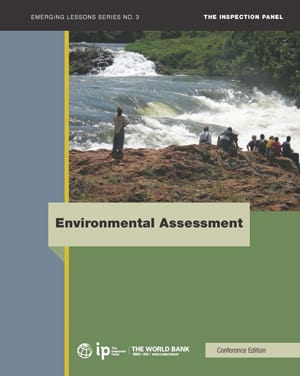
The World Bank Inspection Panel has released a report summarizing lessons on environmental assessment, the third report in its Emerging Lessons Series, which launched in 2016. The reports catalog the lessons the panel has identified from the complex environmental and social cases it has considered since its creation in 1993 as the bank’s independent complaints mechanism.
The first two reports released in the series identified lessons from panel cases involving involuntary resettlement and indigenous peoples’ issues. This latest report, released at the recent International Monetary Fund-World Bank Group Spring Meetings, looks at the lessons emerging from cases related to environmental assessment issues.
What is the World Bank Inspection Panel?
The World Bank Inspection Panel is an independent complaints mechanism for people and communities who believe that they have been, or are likely to be, adversely affected by a World Bank-funded project. The bank’s board of executive directors created the panel in 1993 as an impartial fact-finding body to provide people with an independent avenue through which to express their concerns and seek recourse.
The panel is independent of bank management and reports directly to the board, which appoints the three members for a five-year non-renewable term. It has a secretariat that provides operational and administrative support. For investigations, the panel also utilizes independent experts to ensure objective and professional assessments of the issues.
Since it was created, the panel has received 118 complaints and investigated 34 of them.
Since its inception, 29 of the 34 cases the Inspection Panel has investigated have involved issues related to environmental assessment. This is defined as the process of identifying, predicting, evaluating and mitigating the natural, social and other relevant impacts of development proposals prior to making major decisions and commitments. The panel’s new report identifies seven lessons from its environmental assessment cases, and reaches the following five key conclusions for the World Bank to consider as it moves forward with funding future projects.
1. Environmental assessment is a continuing process.
The process of environmental assessment is important throughout the project cycle. This includes conducting quality impact assessments during project preparation, as well as adequate follow-up on issues arising during implementation. Thorough assessments that integrate natural and social impacts are both required and essential in order to anticipate issues, plan proper mitigation measures, deal with problems that arise in an effective and timely manner, and ensure project sustainability in the long term.
2. Strong supervision is crucial.
This means on-site verification when problems are identified, access to multidisciplinary expertise that goes beyond engineering to environmental and social issues, and consists of continuous dialogue to close potential gaps between the reality on the ground and the perspectives of the project team.
“The process of environmental assessment is important throughout the project cycle … thorough assessments that integrate natural and social impacts are both required and essential.”
— Gonzalo Castro de la Mata and Dilek Barlas, World Bank Inspection Panel3. Consideration of both social and natural impacts is needed.
The World Bank’s environmental assessment policy states that environmental assessment needs to consider social and natural impacts of a project in an integrated manner. The cases that the panel has received, however, show that the environmental assessment process frequently focuses on impacts to the natural environment, and that key social impacts — changes in land use, control over resources and livelihood impacts, for example — are often overlooked. Considering the social dimensions of a project is critical; lapses in analyzing social risks and impacts can create or exacerbate already complex situations.

4. All projects can pose risks.
It is not only high-risk projects — those the World Bank identifies as Category A projects expected to have significant environmental impact and requiring a full environmental assessment — that have the potential to cause harm. The panel has received complaints related to projects in all environmental categories and has investigated nine projects that received Category B designations, where impacts were expected to be site-specific and only a partial environmental assessment was required.
In short, panel cases show it is critical to identify, mitigate and monitor all project risks, regardless of the project’s environmental categorization.
5. Investigation findings lead to improvement.
Finally, panel cases have positively influenced learning at the World Bank. In response to panel investigations, the bank has provided clarifications related to the application of its environmental assessment policy and issued guidelines to staff on how to address relevant issues. Some recent examples include the issuance of a guidance note on managing labor-influx risks in World Bank projects, as well as the creation of a Gender-Based Violence Task Force (GBV) designed to develop recommendations for the institution on how to prevent and respond to GBV in bank projects. Those actions came in response to the panel’s investigation into the Transport Sector Development Project in Uganda.
It is worth noting that panel cases tend to highlight challenging projects where things went wrong. Therefore, the cases discussed in the Emerging Lessons Series do not reflect the bank’s entire portfolio. Nevertheless, the lessons are important, and underscore the intent of the report series: To build the institutional knowledge base at the World Bank, enhance accountability, foster better project results and, ultimately, contribute to more effective development with shared prosperity for all.
The panel’s Emerging Lessons Series report on environmental assessment can be found here.









